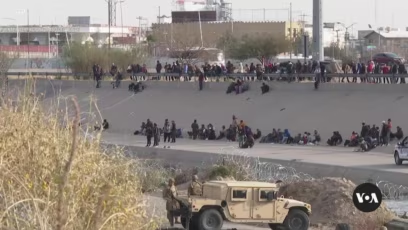
Incoming Trump team prepares military-backed deportations

Analysis:
The incoming administration of President-elect Donald Trump is reportedly preparing plans for deportations of undocumented immigrants, potentially leveraging military resources to support the effort. This marks a significant escalation in immigration enforcement and signals a dramatic shift in policy.
During his campaign, Trump emphasized strict immigration control, often mentioning mass deportations as a key component of his agenda. His rhetoric included plans to create a “deportation force” to remove millions of undocumented immigrants from the United States. While details were scarce at the time, recent developments suggest the use of military infrastructure may play a central role.
Sources close to the Trump transition team indicate discussions are underway about deploying military logistics to aid in transportation, detention, and operational support for Immigration and Customs Enforcement (ICE). Such a move would reflect a blending of civilian law enforcement with military capabilities, a controversial proposition.
Legal experts and human rights organizations have raised immediate concerns. Utilizing the military in domestic law enforcement operations could challenge long-standing legal principles, such as the Posse Comitatus Act, which limits the military’s role in domestic policing. “Using military resources for deportations risks eroding critical boundaries between civil and military authority,” said Karen Rodriguez, an immigration policy analyst.
The logistical scope of the deportations presents significant challenges. Estimates suggest there are over 11 million undocumented immigrants residing in the United States, making mass removals an unprecedented undertaking. Beyond the legal and logistical hurdles, the plan has provoked strong opposition from immigrant advocacy groups, who argue it would result in human rights violations and tear families apart.
In response, a senior official from the transition team defended the proposal, stating, “We are committed to enforcing the law and restoring order. This administration will use all available tools to secure our borders and uphold the integrity of our immigration system.”
The proposal also has implications for relationships between federal agencies and local governments. Many cities, designated as “sanctuary cities,” have vowed to resist federal immigration enforcement, further complicating the administration’s plans.
Observers note that while Trump’s plans appeal to his core supporters, they are likely to face intense political and legal challenges. “This is uncharted territory,” said John Martinez, a constitutional law professor. “The implementation of military-backed deportations would test the limits of executive power and potentially lead to protracted court battles.”
As inauguration day approaches, the nation waits to see how the Trump administration will reconcile its hardline immigration promises with the practical and legal constraints of governance.
Leave a Reply